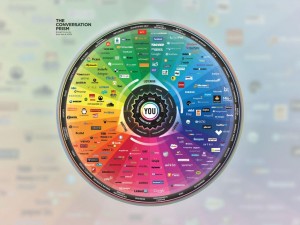As the week draws to a close…
For this post, I chose to focus on two of the six questions that I found most intriguing, along with some personal reflection.
As the week began, I felt overwhelmed. I consider myself quite technologically literate, yet it felt like so much was coming at me from different angles. The communication prism shared in class today illustrated this – so much, everywhere around me, leaving me unsure of where to turn.
As we moved through the week, a level of awareness began to engage. I realized that while I was a happy consumer of many of these technologies, I didn’t necessarily use them in the classroom or teach my students how to use them. I did model the use of applications such as Twitter, show and discuss TED talks, access and share news stories from newspapers around the world, yet I didn’t fully engage my students in this process. Moving forward, I want to focus on ways to bring my students in, while keeping at the forefront why I am doing so.
How were your ideas about ICT in school settings influenced by Will Richardson’s book, “Why School”?
I found the book somewhat problematic. Many of the concerns we’ve addressed in class and on Twitter, namely increasing the number of students for whom a teacher is responsible, lacking a proper infrastructure to support increased technology centred learning, lack of teacher time and training, and concern over not losing many of what we find valuable in the current education system. I’m hoping perhaps that his book was meant more to shock and intrigue as opposed to form a basis for a new educational system. There were many ideas that could be brought in, such as student centred learning and teaching students more independence and focus on what they want to learn.
What issues, interest, or opportunity have you identified as a key topic for your inquiry work next week?
For next week, I believe I would like to start looking at connecting students with the world, and alternative ways of publishing work. I’d like to do so focusing on the use of Twitter. I need to learn more about potential pitfalls, merits, different ways of doing so, thinking about different ways to target audiences, how it can be used curricularly, and more. When looking at my personal Twitter account as a potential topic for 10 Minutes of Fame, I had never realized some of the amazing connections I’ve made. Twitter is part of the reality for our students, and could be an amazing way to bring more of the world in, send them out into the world, rather than just following their friends and a few celebrities.


 Follow
Follow